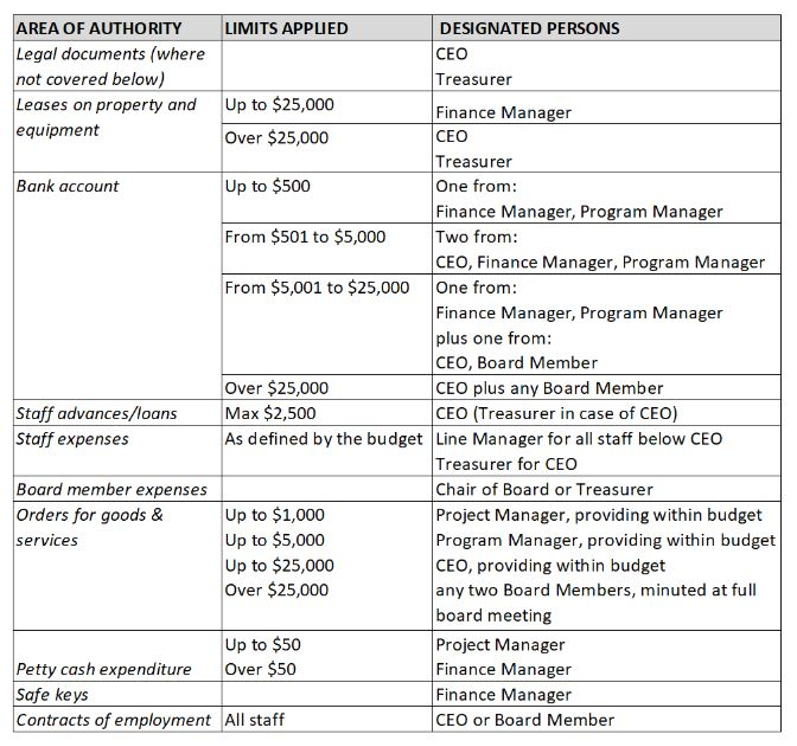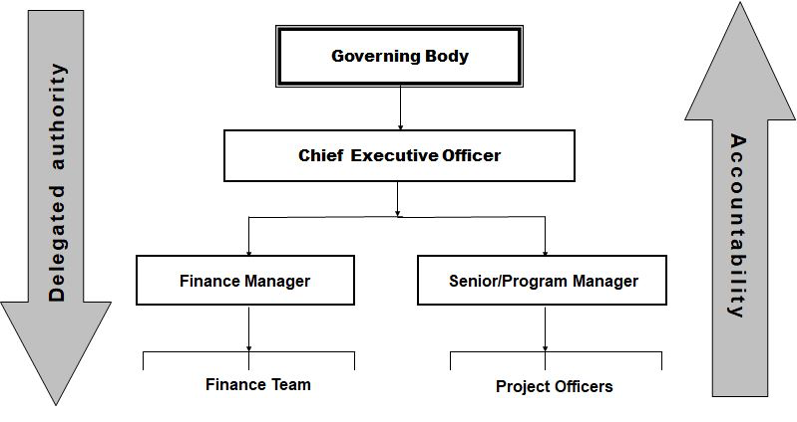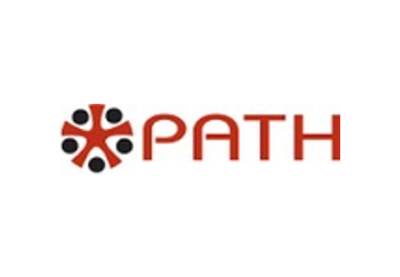Delegation of Authority
I want to clarify financial responsibilities...
What is it?
Strong financial management is the responsibility of everyone in an organization. But this doesn’t mean that everyone has the same level of responsibility. The delegated authority document clarifies who has the responsibility to make decisions, commit expenditure and sign legal undertakings, so there is no confusion about responsibility.
At the project level, the delegated authority document usually explains who has the authority to carry out duties, such as:
- Placing and authorizing orders for goods and services
- Signing checks
- Authorizing staff expenses
- Access to the safe and petty cash
- Handling incoming cash and checks
- Signing legal undertakings
- Checking and authorizing accounting records
- It defines the lowest level of authority. Managers will automatically have at least the same financial authority as their team members and may have more, if this is stated in the document.
- It outlines deputizing arrangements to cover when key staff are absent.
- It prevents anyone from authorizing a transaction from which they will personally benefit.
- It prevents staff authorizing payments to their managers
- It sets out limits and conditions for the authority. It will specify a maximum limit for authorization or define the category of expenditure which can be authorized for each staff or role.

The delegated authority document is usually approved at the highest level of an organization – by the Board. All staff working in an organization need to understand the delegated authority rules. If these are unclear, you won’t know what your responsibility is for authorizing financial commitments. You could be at risk of taking an action outside the scope for your role. This not only puts you at risk, it could compromise the reputation of your organization. A breach of these rules is serious and is dealt with through formal disciplinary procedures.
How do I use it?
The following scenario from UNITAS describes how the delegated authority document is used in its Capacity Building Project.
Amira has hired three people to manage the UNITAS capacity building project with community groups. They attend a workshop to plan their activities. Leading the workshop, Amira emphasizes the importance of good financial management by all team members. The new team members have a lot of questions, “How much financial authority do I have to approve activities or spending? When do I need to ask for Amira’s input?” Amira shares the delegation of authority document with the new team members, which clearly outlines their responsibilities. She also confirms her role in reviewing and approving financial records.
The team needs to buy a new computer. Amira has financial authority to make any purchase up to $1,000 without external authorization. A new laptop costing $995 is purchased by the team and Amira authorizes the purchase documents for payment.
The project team needs to sign a lease for the new training center. The delegated authority document clearly states that Amira does not have authority to sign legal documents and lease contracts, and that these need to be signed by the Finance Manager or the UNITAS CEO. Amira sends the information on the new lease and the document to be signed to the UNITAS main office for approval and signature.
The project needs to purchase training materials for the next six months in advance. The budget is $1,000. After getting quotations the team find the best deal is for a bulk purchase costing $1,015 and the supplier wants the order and payment quite urgently. Amira explains that she does not have authority to sign the purchase documents, even though it is only slightly over her limit of $1,000 and the payment is urgently required. She contacts the Program Manager to ask him to authorize this purchase for the team.
Amira has made sure that her team understand the delegated authority rules at a project level, and demonstrates these with the action she takes. She makes sure that her team understand what they are responsible for and when they need to ask her to authorize something. They now know the rules and are clear about how to implement them. They also understand it is important to follow the delegated authority rules, even when something is urgent.
When do I use it?
Project Managers and their project teams should be familiar with the rules of delegated authority because they impact every financial and legal transaction related to a project. Everyone in a project team needs to understand the limits that each of their roles is given for authorizing financial transactions and commitments.
The delegated authority document usually covers all situations we find in normal operations. During a rapid onset emergency, the situation may mean that the normal rules of delegated authority are not practical or realistic. In these exceptional situations a project team might request a revision to the normal rules to enable them to make larger purchases quickly as part of their response. If an exceptional revision is required, this must go through the proper organizational channels of approval, it will be fully documented, operate on a temporary basis, and will be monitored and revised as the emergency situation evolves.
Who is involved?
Delegated authority cascades through an entire organization, from the Board to the executive team; from the executive team to senior managers; and from senior managers to the implementing teams they manage. A Program Manager may be accountable for the financial management of a number of projects, each of which is led by a Project Manager, who manages a number of teams. The responsibility for day-to-day financial management tasks is delegated down through the line management structure. At the same time, the accountability process moves back up through the hierarchical structure as people report back on progress. The Board is ultimately accountable in law for the financial management of an organization.
Everyone in an organization operates within the rules set by their level of delegated authority. At a project level, this means taking responsibility for a wide range of tasks that have been delegated, and being accountable to line managers for delivering results, monitoring progress and reporting on decisions made.

Tips:
The delegated authority document is an internal document. Funder rules and regulations may overrule the document, where their rules are more strict than the organization’s.
Expectations are often set out in job descriptions, and your tasks and objectives agreed, monitored and supported by your line manager. If you are unclear about anything, it’s important to ask. It is important to know what financial tasks you are responsible for so you can get on with your day-to-today work with confidence!
Supported & Developed by:
Shared by:
Users are free to copy/redistribute and adapt/transform
for non-commercial purposes.
© 2022 All rights reserved.



















 .
.